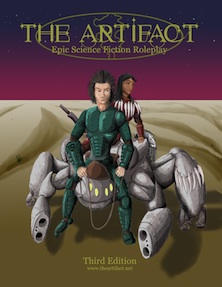I really like tech challenges. I’ve had a lot of interesting things happen in games because of them. That’s mainly because I read the “tech” not as “technology”, but as “technical.” The difference is significant.
That’s the first change, they should be Technical Challenges, so their use is better understood. What does this do? For example, I’ve used Technical Challenges when a character was picking a lock. A player decided to try and help by using their vehicle’s enhanced sensor system to scan the lock and understand how it worked. The result was an interesting story, that the players still tell. I’ve also used Technical Challenges in a diplomatic negotiation, where the characters needed to use cultural information to decipher a person’s responses.
The official process in the book is too complicated though and the “transforms” (hereafter called consequences) don’t feel right. The rules call for new skills that players want to use, be tested via a three step process. It’s too cumbersome, but it does allow for novel solutions that the GM might not have otherwise allowed.
I see rules as an arbiter between the players and the GM, something like laws that apply to police. The rules give the players power to do things they may not have felt like they were allowed to do. The problem with this strategy is if the player never digs deep into the rules, they don’t know they have this structure available. They want to get to the point and start knocking down the problem. That makes the whole structure pointless, the GM can try to enforce it but at that point the rules are just in the way.
One solution would be for the GM to pick a set of skills that could be used to attack a technical challenge and to be open to reasonable suggestions by players, especially if they have a way the skill could apply to the challenge. I do want some mechanism for players to challenge a GM veto, because I feel that there are often unusual solutions to problems that people feel could never work, just because they’ve never seen it.
Usually at the table the situation goes like this. I’ll state a suggested skill that will be effective in taking down the challenge. One of the players will look at their sheet and not have that skill. They may allow the characters with the skill to start rolling, but either if the others are failing rolls or if they just feel bored, they’ll ask if they can use one of their skills to help. In most cases, the angle they’re trying to use the skill in is unusual but often interesting.
Let’s split the difference. Since these unusual skill applications shouldn’t solve the problem all by themselves, for example, using sensors to pick a lock, the characters can use an unusual skill only after one of the primary skills has been successful. Each time an unusual skill is used, another successful primary skill roll is needed before they can try again. Primary skills can be used repeatedly. If the GM feels the skill is unsuitable, they should allow the roll, but the consequences should be greater (possibly double or more) than a primary skill roll. This deincentivizes the use of random skills, but wouldn’t leave the characters in the lurch if for some reason no one was able to use the primary skills.
On to the issue of Consequences. Technical Challenges are set up so that the challenge responds to the character’s efforts to solve the problem. If every combat was solved by “I hit it with my sword” then combat would be quite boring. Consequences are there to keep the problem changing and keep it interesting. The problem is, I don’t think that many changes are needed. In play, I rarely impose as many consequences as are called for mainly because they slow down play. Even with failures, I don’t always use a consequence, because it doesn’t always make sense to.
Consequences are important though, because the challenge is the opposition. If it just sits there and doesn’t change, it’s boring. So let’s make this simple. The main consequence of a failed roll is that the character takes a stress point. But each turn, the GM can roll for or impose a consequence that makes sense. Here, the challenge is behaving more like a monster does, that it gets a way to fight back but on it’s own turn so to speak. This way the players can all work on the problem quickly and then the GM can apply the consequence.
I think those changes would streamline the system significantly.
I would have to figure out how to work the technical challenges in the Players Handbook for crafting equipment though. In each of those cases, the rolls are much more concrete because the consequences are very specific to the tasks. The new way of running the challenge would make designing equipment far easier in a group. That makes sense, but a large group would be overly effective. I’d have to restructure the number of challenge points. It would remove the need for two consequence tables, making the results more standard. It would be difficult to model a whole nation (like the Scimrahn) designing a vehicle. In short, I can’t recommend using this simplified system for that yet.


 The Free RPG Blog
The Free RPG Blog